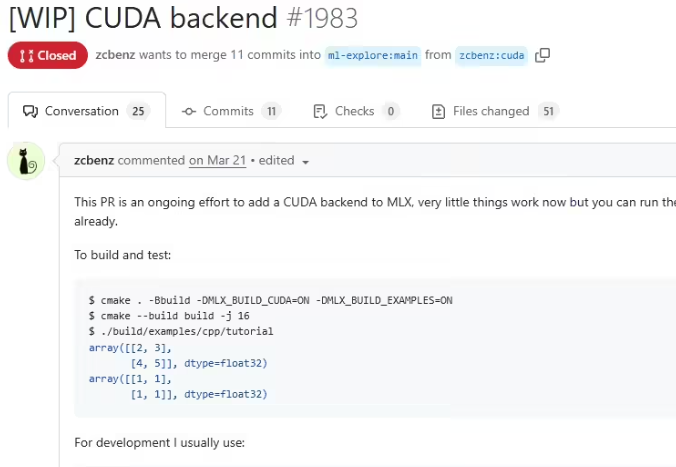Recently, Apple announced that its machine learning framework MLX, designed specifically for Apple Silicon, is adding support for NVIDIA CUDA. This update allows developers to develop applications using MLX on Apple Silicon Macs and smoothly export them to run in a CUDA environment. This change marks another significant advancement for Apple in the field of machine learning.

Previously, due to MLX's deep integration with Apple's Metal platform, developers could not perform related operations outside of macOS systems, so they often needed to purchase additional hardware for deployment and testing. The new CUDA support will change this situation, allowing developers to use Apple devices for development and testing, and then switch to high-performance CUDA hardware for actual operation.
This update was led by GitHub developer @zcbenz, who began working on CUDA support code several months ago. After a series of module splits, the project was successfully merged into Apple's main branch of MLX. It should be noted that this support is limited to exporting code from the MLX framework adapted for the Apple environment, so it can run on servers with NVIDIA GPUs. In other words, Mac Pro or external GPU docks do not support directly connecting NVIDIA GPUs to run machine learning applications locally, but rather require code adaptation and export after development.
This new feature is particularly important for developers, as NVIDIA hardware configuration costs are extremely high, often several times the price of a top-of-the-line Mac. This means small development teams can develop and test on Apple Silicon devices, and only need to use NVIDIA hardware during the mass production phase, effectively controlling costs. Additionally, the performance of the MLX project running in the CUDA system is usually far superior to that on Mac. Combined with the widespread use of NVIDIA hardware in the field of machine learning, developers will have the opportunity to gain stronger computing power support, improving the performance and effectiveness of their applications.
This update to Apple's MLX framework not only provides developers with more flexibility but also reduces the cost of developing machine learning applications, and is expected to attract more attention and participation from developers.
Key Points:
🌟 Apple's MLX framework now supports NVIDIA CUDA, enhancing developers' flexibility.
💰 Developers can develop on Apple Silicon devices, reducing reliance on expensive NVIDIA hardware.
🚀 Performance under CUDA environments exceeds that of Mac, providing developers with stronger computing power support.
